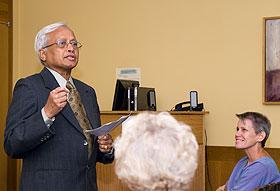  |
| HOME | THIS ISSUE | CALENDAR | GRANTS | BACK ISSUES | < BACK | NEXT > |
Speaker from India offers perspective on U.S. presidential campaign
|
||||
| The 2008 U.S. presidential election is generating enormous interest in India, according to Ramesh Babu, a former professor at the University of Bombay, one-time mayor of that city, and longtime researcher on American elections. He spoke on Sept. 15 at Homer Babbidge Library as part of an ongoing lecture series organized by the India Studies Program. Babu, who has written a book on the relevance of American elections to India, is in the U.S. for several months to closely follow the 2008 presidential election. He recently attended the Republican National Convention in Minnesota. Babu said the 2008 primaries and general election are receiving unprecedented press coverage in India. In part, he said, this is because what the U.S. does and says has a tremendous effect on India, but it is also related to the groundbreaking nature of the race, with a black man and a woman competing for the Democratic nomination. He told the audience early on that were he an American citizen, he would vote for Sen. Barack Obama. Babu said he felt Indians would like to see an American president who has a “broad world view, rather than just an American view.” While not sparing his home country criticism, he discussed what he perceived as the flaws in U.S. political campaigns. “There’s too much oversimplification of elections in this country,” he said, suggesting that campaigns and their coverage in the media often lack substance, focusing on personal narratives like family and personality instead of issues.
He observed that many Americans are against “big government,” unless some aspect of it benefits them. The same, he said, seems to be true with so-called pork barrel spending – funds appropriated by Congress for specific projects in states and congressional districts. While candidates often run against those that are needless and wildly expensive, many are important to members of Congress and the communities that receive them. Babu also discussed the U.S. financial meltdown and commented that the vocabulary shifts according to context when it comes to government intervention. “Rescuing companies, that’s alright, but to rescue a welfare recipient is socialism,” he said. In an odd paradox, Babu said, although Indians are generally opposed to many of President George W. Bush’s policies, he is one of the most popular American presidents in India, owing to an impending nuclear deal between the U.S. and India that would lift the moratorium on nuclear trade between the two nations. With regard to what election outcome would be best for India, Babu said that should not be a question Indians ask themselves. “India should be ready to act like a global power,” he said. “Then it does not matter who wins.” |
| ADVANCE HOME UCONN HOME |

